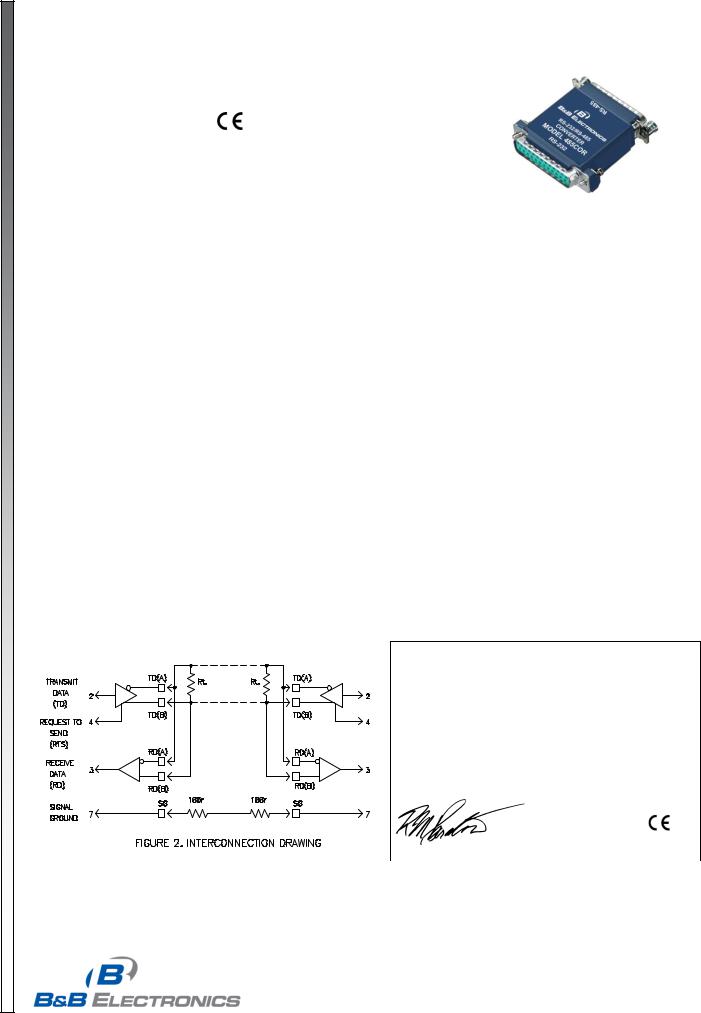B&B Electronics 485COR Datasheet

B&B ELECTRONICS
PRODUCT INFORMATION
Document No. 485COR0812 - pg. 1/2
RS-232 to RS-485 Converter
Model 485COR
This RS-232 to RS-485 converter converts unbalanced, full-duplex RS-232 signals to balanced, full-duplex or half-duplex RS-485 signals. RS-485 is an enhanced version of the RS-422 balanced line standard. It allows multiple drivers and receivers on a two-wire system.
The RS-232 port uses a female DB-25S type of connector with pins 2 (TD input) and 3 (RD output) supported. Protective Ground (pin 1) and Signal Ground (pin 7) are also connected. The RS-485 port uses a male DB-25P type of connector with the Send Data outputs on pins 2 and 14, and Receive Data inputs on pins 5 and 17. Protective Ground (pin 1) and Signal Ground (pin 7) are connected through to the RS-232 connector.
The polarity of the two RS-485 lines must be correct. With no data being sent, the RS-232 line should be negative and the RS-485 "A" terminal should be negative with respect to the "B" terminal. If your equipment uses a "+" and "-" naming scheme, in most cases the "A" line will be connected to the "-" and the "B" line will be connected to the "+". The RS-485 driver must be enabled when checking the polarity of the output of an RS-485 driver. On this connector, the RTS input, pin (4), on the RS-232 side must be raised to enable the RS-485 driver.
Figure 2 shows how to interconnect two RS-485 converters using two signal wires. The resistors Rt are optional, depending on the line length, baud rate, etc. The resistors should be about the impedance of the line used, which is normally about 120 ohms each. RTS must be off (low or marking) to receive and on (high or spacing) to transmit. Both RTS's should not be on at the same time. Although you will not damage anything, the data sent will be garbled. If both RTS lines are off, the line may be floating and random data may appear on the outputs. Your protocol should allow for this if it can happen.
Up to 32 receivers can be driven by any one generator. This allows you to put together large systems with many drop points. The termination resistors should be located at approximately opposite ends of the system.
Proper operation of any RS-485 system requires the presence of a signal return path. The RS-485 Standard recommends that a third wire be used for this. For safety, a 100 ohm resistor should be connected between pin 7 and the "reference" wire at every drop point. While it may be possible to interconnect signal grounds (pin 7s) directly, this is not recommended due to the danger of circulating currents possibly being present.
No wire type or maximum run length is listed in the RS-485 Standard. However, the RS-422 Standard, which is very similar, recommends 4000 ft. of number 24 AWG twisted pair telephone cable with a shunt capacitance of 16 picofarads per foot.
DECLARATION OF CONFORMITY
Manufacturer’s Name: |
B&B Electronics Manufacturing Company |
Manufacturer’s Address: |
P.O. Box 1040 |
|
707 Dayton Road |
|
Ottawa, IL 61350 USA |
Model Number: |
485COR |
Description: |
RS-485 Converter |
Type: |
Light industrial ITE equipment |
Application of Council Directive: |
89/336/EEC |
Standards: |
EN 50082-1 (IEC 801-2, IEC 801-3, IEC 801-4) |
|
EN 50081-1 (EN 55022, IEC 1000-4-2) |
|
EN 61000 (-4-2, -4-3, -4-4, -4-5, -4-6, -4-8, -4-11) |
|
ENV 50204 |
|
EN 55024 |
Robert M. Paratore, Director of Engineering
www.bb-elec.com orders@bb-elec.com support@bb-elec.com
International Office: 707 Dayton Road PO Box 1040 Ottawa, IL 61350 USA 815-433-5100 Fax 433-5104
European Office: Westlink Commercial Park Oranmore Co. Galway Ireland +353 91 792444 Fax +353 91 792445
